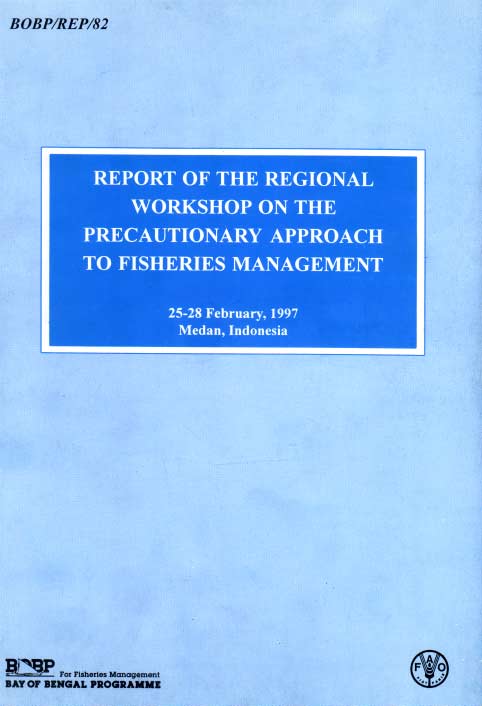
REPORTS - BOBP/REP/82
Report of the Regional Workshop on the Precautionary Approach to Fishery Management
Medan, Indonesia; 25-28 February, 1997
 |
REPORTS - BOBP/REP/82 Report of the Regional Workshop on the Precautionary Approach to Fishery ManagementMedan, Indonesia; 25-28 February, 1997 |
|
Executing Agency: FOOD AND AGRICULTURE ORGANIZATION OF THE UNITED NATIONS Funding Agency: UNITED NATIONS DEVELOPMENT PROGRAMME BAY OF BENGAL PROGRAMME Chennai, India 1999 |
| The designations employed and the presentation of material in this publication do not imply the expression of any opinion whatsoever on the part of the Food and Agriculture Organization of the United Nations concerning the legal status of any country, territory, city or area or of its authorities, or concerning the delimitation of its frontiers or boundaries. |
All rights reserved. Reproduction and dissemination of material in this information product for educational or other non-commercial purposes are authorized without any prior written permission from the copyright holders provided the source is fully acknowledged. Reproduction of material in this information product for resale or other commercial purposes is prohibited without written permission of the copyright holders. Applications for such permission should be addressed to the Chief, Publishing and Multimedia Service, Information Division, FAO, Viale delle Terme di Caracalla, 00100 Rome, Italy or by email to [email protected]
© FAO 2004
|
This document reports on the proceedings and decisions of a four-day regional workshop on the “Precautionary Approach to Fishery Management” (referred to in the text as PA2FM), held from 25 February to 28 February, 1997, in Medan, North Sumatra, Indonesia. It was organized by the Directorate-General of Fisheries, Indonesia, and supported by the FAO and the Bay of Bengal Programme (BOBP). The workshop was meant to clarify and discuss the implications of PA2FM and show how such an approach to management enables sustainable development of fisheries resources in BOBP member-countries and beyond. The workshop was expected to endow participants with practical skills and knowledge on PA2FM methods. The workshop was attended by 18 representatives from member-countries of the BOBP, and seven resource persons from within and outside the region. |
1. WORKSHOP SUMMARY
2. WORKSHOP PROSPECTUS
3. AGENDA
4. LIST OF PARTICIPANTS
5. KEYNOTE ADDRESS BY DR SERGE GARCIA, DIRECTOR, FISHERY RESOURCES DIVISION, FAO, ROME
6.1. Bangladesh
6.2 India
6.3 Indonesia
6.4 Malaysia
6.5 Maldives
6.6 Sri Lanka
6.7 Thailand
7. ROLE OF SCIENTIFIC ADVICE ON OPERATIONALIZATION AND IMPLEMENTATION OF THE CODE OF CONDUCT FOR RESPONSIBLE FISHERIES By John Fitzpatrick, FAO consultant
8. OVERVIEW OF FISHERIES MANAGEMENT IN INDONESIA: PAST, PRESENT AND FUTURE by Sukotjo Adisukresno, Director, Directorate of Resources Management, Directorate-General of Fisheries, Indonesia
9. GOVERNMENT DECISION-MAKING UNDER UNCERTAINTY: A CASE FOR FISHERIES MANAGEMENT by- Fuad Cholik (Central Research Institute of Fisheries) & Johanes Widodo (Research Institute for Marine Fisheries, Agency for Agriculture Research & Development, Jakarta, Indonesia)
10. OVERVIEW OF FISHERIES MANAGEMENT IN ASIA: PAST, PRESENT AND FUTURE by Nik Mustapha R Abdullah & K Kuperan. Department of Natural Resource Economics, Universiti Pertanian Malaysia, Serdang Selangor
11. U.S. EXPERIENCE IN IMPLEMENTING THE PRECAUTIONARY APPROACH TO FISHERIES MANAGEMENT by Stanley Wang and Andrew Rosenberg
12. OVERVIEW AND PRACTICAL IMPLICATIONS OF THE PRECAUTIONARY APPROACH TO FISHERIES MANAGEMENT AND THE CODE OF CONDUCT FOR RESPONSIBLE FISHERIES TO SMALL-SCALE FISHERIES by G.L. Preston, Gillett & Preston Associates, Noumea, New Caledonia
13.OPERATIONALIZING AND IMPLEMENTING OF THE CODE OF CONDUCT FOR RESPONSIBLE FISHERIES by Dr John Kurien, Associate Professor, Centre for Development Studies, Thiruvananthapuram, India
14. IDENTIFICATION OF UNRESOLVED AND NEW ISSUES IN FISHERIES MANAGEMENT by Dr John Kurien; Centre for Development Studies, Thiruvananthnpuram, India & Kee-Chai Chong, Programme Coordinator, Bay of Bengal Programme, Chennai, India
15. DO FISHERIES STATISTICS GIVE THE FULL PICTURE? INDONESIA’S NON-RECORDED FISH PROBLEM by Dr Nick Walloughby (Team Leader, Marine Resource Evaluation/Planning Project), Daniel R. Monintja (Institute Pertanian, Bogor, Indonesia) & M. Badrudin (Central Institute for Fisheries, Jakarta)
16. ENCOURAGING FISHERFOLK TO MANAGE THEIR FISHERIES : HOW COMMUNICATION AND AWARENESS CAN HELP by Rathin Roy, Senior Communication Adviser; BOBP
17. GUIDELINES FOR GROUP DISCUSSION
Group 1: Selling the idea of precautionary fisheries management
Group 2: Operationalizing fisheries management
Group 3: Implications of PA2FM for Small-Scale/Artisanal Fisheries18. SUMMARY OF GROUP DISCUSSIONS